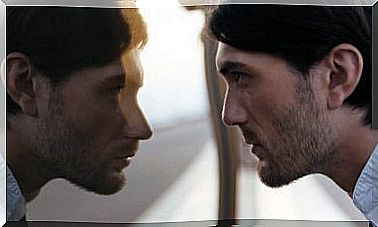Passive Aggression And Jealousy: Silent Wear And Tear

Jealousy and passive aggression often go hand in hand. These dimensions are, from a psychological point of view, a type of emotion as complex as it is lethal, in which the fear of abandonment, the feeling of humiliation and, of course, anger are mixed.
The fact of feeling jealous is something that, as we know, has no age, gender or culture, and it generates, in turn, situations as dangerous as they are destructive.
Something that draws attention in Shakespeare’s works, when we delve into them, is his ability to portray all that kaleidoscope of emotions, traits and situations that define the human being.
Thus, one of his most impressive legacies is still Othello, highlighting above all the character of one of the most unique and also most Machiavellian villains: Iago.
Othello’s skillful and malicious servant was responsible for causing him to lose his mind, making him believe that Desdemona, his wife, was unfaithful. Iago came to symbolize that obsessive and pernicious inner voice that fuels the fire of jealousy.
It perfectly represented our obsessive and suspicious mind, a mental echo that gives form to the root of jealousy that, little by little, persistently advances and falls to the precipice of fatality.
William Shakespeare, in fact, considered Iago as one of his most decisive characters: he dedicated about 1097 lines to him, almost as many as Hamlet or Richard III.

Jealousy and passive aggression: the inner voice that devours
Jealousy and passive aggression are two dimensions that orbit together. Jealous people do not show this emotion directly and openly. That is, the person does not approach the partner and says with complete assertiveness that he feels offended when he speaks to others, that he feels anger and humiliation when he smiles and spends time with other people.
Instead, what is usually done is to apply passive aggressiveness, with which, instead of words, censorship, covert blackmail, mysterious threats, continuous contempt, indirect punishments in which silence, indifference are used are used …
It’s a kind of aggressiveness that at first feels cold, but can sometimes ripen into a more active aggressiveness and, of course, harmful.
We will see more data below.
Jealousy and the alter ego
There is a striking fact that William Shakespeare himself played perfectly with the characters of Iago and Othello. Jealousy resonates in the person like an alter ego, like an outside voice that settles in and kidnaps us.
This figure fuels the fear of being abandoned and betrayed. It injects us with distrust and alerts us to non-existent dangers, lies, puts signs in our eyes and is sure of crazy ideas that suddenly become reasonable.
A study by Dr. David DeSteno of the University of California indicates that this voice symbolizes the “threatened self”, that part of us that feels violated and that, little by little, ends up exhibiting passive-aggressive behaviors.

Are jealousy and passive aggression a genetic component in humans?
There are theories that speak, in fact, of a genetic basis for this type of behavior. Jealousy and passive aggression make up a kind of dark logic that, according to some psychology and anthropology, would be in our genes.
According to this approach, the human being is the result of evolution based on survival and mating. Social competitiveness, coupled with the fear of being betrayed and left alone, is a kind of alarm that triggers a whole range of emotions and thoughts.
The mind becomes hypervigilant, obsessive, and dimensions like anger take over. Hence the behavioral aggressiveness and the obvious risk that this entails.
Is managing and reducing jealousy possible?
The key to dealing with jealousy is understanding a very clear fact: absolute and lasting fidelity does not exist. We could tell the jealous person that loving is trusting, that wanting is not possessing, and that healthy affection leaves aside anger, the need for dominance, and hypervigilance.
However, sometimes we may be facing a behavior based on pathological jealousy (PC), in which a series of disorders linked to delusions arise. In these situations, it is essential to resort to psychological therapy. Thus, for the question of whether jealousy can be reduced, it is worth understanding a simple aspect: each person is unique.
We can focus therapy on reducing control behaviors (such as looking at a partner’s cell phone), as well as deactivating obsessive thoughts and strengthening self-esteem and anxiety stemming from the fear of abandonment.
However, it is necessary, above all, the patient’s clear willingness to change, towards a clear awareness that jealousy is not compatible with a healthy love relationship. Let’s keep that in mind.









